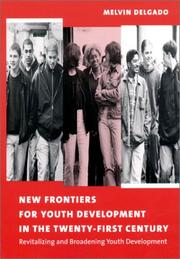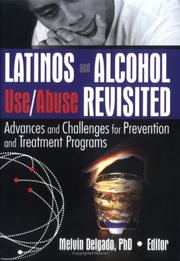| Listing 1 - 10 of 218 | << page >> |
Sort by
|

ISBN: 0814744281 0585317011 9780585317014 0814718779 9780814718773 9780814744284 Year: 2020 Publisher: New York, NY
Abstract | Keywords | Export | Availability | Bookmark
 Loading...
Loading...Choose an application
- Reference Manager
- EndNote
- RefWorks (Direct export to RefWorks)
In The Washington Post, Julius Lester praised Richard Delgado's The Rodrigo Chronicles: Conversations about America and Race as free of cant and ideology. . . . an excellent starting place for the national discussion about race we so desperately need. The New York Times has hailed Delgado as a pioneer in the study of race and law, and the Los Angeles Times has compared his storytelling style to Plato's Dialogues. In The Coming Race War?, Delgado turns his attention to the American racial landscape in the wake of the mid-term elections in 1994. Our political and racial topography has been radically altered. Affirmative action is being rolled back, immigrants continue to be targeted as the source of economic woes, and race is increasingly downplayed as a source of the nation's problems. Legal obstacles to racial equality have long been removed, we are told, so what's the problem? And yet, the plight of the urban poor grows worse. The number of young black men in prison continues to exceed those in college. Informal racial privilege remains entrenched and systemic. Where, asks Delgado in this new volume, will this lead? Enlisting his fictional counterpart, Rodrigo Crenshaw, to untangle the complexities of America's racial future, Delgado explores merit and affirmative action; the nature of empathy and, more commonly, false empathy; and the limitations of legal change. Warning of the dangers of depriving the underprivileged of all hope and opportunity, Delgado gives us a dark future in which an indignant white America casts aside, once and for all, the spirit of the civil rights movement, with disastrous results.
Affirmative action programs --- African Americans --- Civil rights. --- United States --- ABŞ --- ABSh --- Ameerika Ühendriigid --- America (Republic) --- Amerika Birlăshmish Shtatlary --- Amerika Birlăşmi Ştatları --- Amerika Birlăşmiş Ştatları --- Amerika ka Kelenyalen Jamanaw --- Amerika Qūrama Shtattary --- Amerika Qŭshma Shtatlari --- Amerika Qushma Shtattary --- Amerika (Republic) --- Amerikai Egyesült Államok --- Amerikanʹ Veĭtʹsėndi︠a︡vks Shtattnė --- Amerikări Pĕrleshu̇llĕ Shtatsem --- Amerikas Forenede Stater --- Amerikayi Miatsʻyal Nahangner --- Ameriketako Estatu Batuak --- Amirika Carékat --- AQSh --- Ar. ha-B. --- Arhab --- Artsot ha-Berit --- Artzois Ha'bris --- Bí-kok --- Ē.P.A. --- EE.UU. --- Egyesült Államok --- ĒPA --- Estados Unidos --- Estados Unidos da América do Norte --- Estados Unidos de América --- Estaos Xuníos --- Estaos Xuníos d'América --- Estatos Unitos --- Estatos Unitos d'America --- Estats Units d'Amèrica --- Ètats-Unis d'Amèrica --- États-Unis d'Amérique --- Fareyniḳṭe Shṭaṭn --- Feriene Steaten --- Feriene Steaten fan Amearika --- Forente stater --- FS --- Hēnomenai Politeiai Amerikēs --- Hēnōmenes Politeies tēs Amerikēs --- Hiwsisayin Amerikayi Miatsʻeal Tērutʻiwnkʻ --- Istadus Unidus --- Jungtinės Amerikos valstybės --- Mei guo --- Mei-kuo --- Meiguo --- Mî-koet --- Miatsʻyal Nahangner --- Miguk --- Na Stàitean Aonaichte --- NSA --- S.U.A. --- SAD --- Saharat ʻAmērikā --- SASht --- Severo-Amerikanskie Shtaty --- Severo-Amerikanskie Soedinennye Shtaty --- Si︠e︡vero-Amerikanskīe Soedinennye Shtaty --- Sjedinjene Američke Države --- Soedinennye Shtaty Ameriki --- Soedinennye Shtaty Severnoĭ Ameriki --- Soedinennye Shtaty Si︠e︡vernoĭ Ameriki --- Spojené staty americké --- SShA --- Stadoù-Unanet Amerika --- Stáit Aontaithe Mheiriceá --- Stany Zjednoczone --- Stati Uniti --- Stati Uniti d'America --- Stâts Unîts --- Stâts Unîts di Americhe --- Steatyn Unnaneysit --- Steatyn Unnaneysit America --- SUA (Stati Uniti d'America) --- Sŭedineni amerikanski shtati --- Sŭedinenite shtati --- Tetã peteĩ reko Amérikagua --- U.S. --- U.S.A. --- United States of America --- Unol Daleithiau --- Unol Daleithiau America --- Unuiĝintaj Ŝtatoj de Ameriko --- US --- USA --- Usono --- Vaeinigte Staatn --- Vaeinigte Staatn vo Amerika --- Vereinigte Staaten --- Vereinigte Staaten von Amerika --- Verenigde State van Amerika --- Verenigde Staten --- VS --- VSA --- Wááshindoon Bikéyah Ałhidadiidzooígíí --- Wilāyāt al-Muttaḥidah --- Wilāyāt al-Muttaḥidah al-Amirīkīyah --- Wilāyāt al-Muttaḥidah al-Amrīkīyah --- Yhdysvallat --- Yunaeted Stet --- Yunaeted Stet blong Amerika --- ZDA --- Združene države Amerike --- Zʹi︠e︡dnani Derz︠h︡avy Ameryky --- Zjadnośone staty Ameriki --- Zluchanyi︠a︡ Shtaty Ameryki --- Zlucheni Derz︠h︡avy --- ZSA --- Η.Π.Α. --- Ηνωμένες Πολιτείες της Αμερικής --- Америка (Republic) --- Американь Вейтьсэндявкс Штаттнэ --- Америкӑри Пӗрлешӳллӗ Штатсем --- САЩ --- Съединените щати --- Злучаныя Штаты Амерыкі --- ولايات المتحدة --- ولايات المتّحدة الأمريكيّة --- ولايات المتحدة الامريكية --- 미국 --- Race relations --- Forecasting. --- Race relations. --- Race question --- Spojené obce severoamerické --- États-Unis --- É.-U. --- ÉU
Book
ISBN: 0804783713 9780804783712 9780804778145 0804778140 Year: 2012 Publisher: Stanford, Calif. Stanford University Press
Abstract | Keywords | Export | Availability | Bookmark
 Loading...
Loading...Choose an application
- Reference Manager
- EndNote
- RefWorks (Direct export to RefWorks)
Making the Chinese Mexican is the first book to examine the Chinese diaspora in the U.S.-Mexico borderlands. It presents a fresh perspective on immigration, nationalism, and racism through the experiences of Chinese migrants in the region during the late nineteenth and early twentieth centuries. Navigating the interlocking global and local systems of migration that underlay Chinese borderlands communities, the author situates the often-paradoxical existence of these communities within the turbulence of exclusionary nationalisms. The world of Chinese fronterizos (bord
Chinese --- Immigrants --- Emigrants --- Foreign-born population --- Foreign population --- Foreigners --- Migrants --- Persons --- Aliens --- Ethnology --- Ethnic identity --- History --- Cultural assimilation --- Mexican-American Border Region --- Mexico --- United States --- American-Mexican Border Region --- Border Region, American-Mexican --- Border Region, Mexican-American --- Borderlands (Mexico and U.S.) --- Mexico-United States Border Region --- Tierras Fronterizas de México-Estados Unidos --- United States-Mexico Border Region --- ABŞ --- ABSh --- Ameerika Ühendriigid --- America (Republic) --- Amerika Birlăshmish Shtatlary --- Amerika Birlăşmi Ştatları --- Amerika Birlăşmiş Ştatları --- Amerika ka Kelenyalen Jamanaw --- Amerika Qūrama Shtattary --- Amerika Qŭshma Shtatlari --- Amerika Qushma Shtattary --- Amerika (Republic) --- Amerikai Egyesült Államok --- Amerikanʹ Veĭtʹsėndi︠a︡vks Shtattnė --- Amerikări Pĕrleshu̇llĕ Shtatsem --- Amerikas Forenede Stater --- Amerikayi Miatsʻyal Nahangner --- Ameriketako Estatu Batuak --- Amirika Carékat --- AQSh --- Ar. ha-B. --- Arhab --- Artsot ha-Berit --- Artzois Ha'bris --- Bí-kok --- Ē.P.A. --- EE.UU. --- Egyesült Államok --- ĒPA --- Estados Unidos --- Estados Unidos da América do Norte --- Estados Unidos de América --- Estaos Xuníos --- Estaos Xuníos d'América --- Estatos Unitos --- Estatos Unitos d'America --- Estats Units d'Amèrica --- Ètats-Unis d'Amèrica --- États-Unis d'Amérique --- Fareyniḳṭe Shṭaṭn --- Feriene Steaten --- Feriene Steaten fan Amearika --- Forente stater --- FS --- Hēnomenai Politeiai Amerikēs --- Hēnōmenes Politeies tēs Amerikēs --- Hiwsisayin Amerikayi Miatsʻeal Tērutʻiwnkʻ --- Istadus Unidus --- Jungtinės Amerikos valstybės --- Mei guo --- Mei-kuo --- Meiguo --- Mî-koet --- Miatsʻyal Nahangner --- Miguk --- Na Stàitean Aonaichte --- NSA --- S.U.A. --- SAD --- Saharat ʻAmērikā --- SASht --- Severo-Amerikanskie Shtaty --- Severo-Amerikanskie Soedinennye Shtaty --- Si︠e︡vero-Amerikanskīe Soedinennye Shtaty --- Sjedinjene Američke Države --- Soedinennye Shtaty Ameriki --- Soedinennye Shtaty Severnoĭ Ameriki --- Soedinennye Shtaty Si︠e︡vernoĭ Ameriki --- Spojené staty americké --- SShA --- Stadoù-Unanet Amerika --- Stáit Aontaithe Mheiriceá --- Stany Zjednoczone --- Stati Uniti --- Stati Uniti d'America --- Stâts Unîts --- Stâts Unîts di Americhe --- Steatyn Unnaneysit --- Steatyn Unnaneysit America --- SUA (Stati Uniti d'America) --- Sŭedineni amerikanski shtati --- Sŭedinenite shtati --- Tetã peteĩ reko Amérikagua --- U.S. --- U.S.A. --- United States of America --- Unol Daleithiau --- Unol Daleithiau America --- Unuiĝintaj Ŝtatoj de Ameriko --- US --- USA --- Usono --- Vaeinigte Staatn --- Vaeinigte Staatn vo Amerika --- Vereinigte Staaten --- Vereinigte Staaten von Amerika --- Verenigde State van Amerika --- Verenigde Staten --- VS --- VSA --- Wááshindoon Bikéyah Ałhidadiidzooígíí --- Wilāyāt al-Muttaḥidah --- Wilāyāt al-Muttaḥidah al-Amirīkīyah --- Wilāyāt al-Muttaḥidah al-Amrīkīyah --- Yhdysvallat --- Yunaeted Stet --- Yunaeted Stet blong Amerika --- ZDA --- Združene države Amerike --- Zʹi︠e︡dnani Derz︠h︡avy Ameryky --- Zjadnośone staty Ameriki --- Zluchanyi︠a︡ Shtaty Ameryki --- Zlucheni Derz︠h︡avy --- ZSA --- Η.Π.Α. --- Ηνωμένες Πολιτείες της Αμερικής --- Америка (Republic) --- Американь Вейтьсэндявкс Штаттнэ --- Америкӑри Пӗрлешӳллӗ Штатсем --- САЩ --- Съединените щати --- Злучаныя Штаты Амерыкі --- ولايات المتحدة --- ولايات المتّحدة الأمريكيّة --- ولايات المتحدة الامريكية --- 미국 --- Anáhuac --- Estados Unidos Mexicanos --- Maxico --- Méjico --- Mekishiko --- Meḳsiḳe --- Meksiko --- Meksyk --- Messico --- Mexique (Country) --- República Mexicana --- Stany Zjednoczone Meksyku --- United Mexican States --- United States of Mexico --- מקסיקו --- メキシコ --- Race relations --- Political aspects --- Emigration and immigration --- Government policy --- Spojené obce severoamerické --- États-Unis --- É.-U. --- ÉU

ISBN: 0231504632 9780231504638 0231122810 9780231122818 0231122802 9780231122801 Year: 2002 Publisher: New York Columbia University Press
Abstract | Keywords | Export | Availability | Bookmark
 Loading...
Loading...Choose an application
- Reference Manager
- EndNote
- RefWorks (Direct export to RefWorks)

ISBN: 020305136X 128388660X 113643920X 9781136439209 9780203051368 0789029251 9780789029256 078902926X 9780789029263 9781136439278 1136439277 9781136439346 113643934X Year: 2005 Publisher: New York Haworth Press
Abstract | Keywords | Export | Availability | Bookmark
 Loading...
Loading...Choose an application
- Reference Manager
- EndNote
- RefWorks (Direct export to RefWorks)
The one-of-a-kind exploration of effective alcohol prevention and treatment for Latinos-now and for the future!By the year 2020, the Latino population in the United States will increase to 60 million, making up 18 percent of all residents. Latinos and Alcohol Use/Abuse Revisited: Advances and Challenges for Prevention and Treatment Programs brings into sharp focus how present and future demographic shifts in Latino population are being felt in alcohol programs across the United States. Case studies and in-depth research clearly illustrate the practical steps various culturally comp
Hispanic Americans --- Alcoholism --- Alcohol use. --- Prevention. --- Treatment
Book
ISBN: 1588269426 9781588269423 9781588268181 1588268187 Year: 2022 Publisher: Boulder
Abstract | Keywords | Export | Availability | Bookmark
 Loading...
Loading...Choose an application
- Reference Manager
- EndNote
- RefWorks (Direct export to RefWorks)
Convicted offenders need jobs when they leave prison—but few people want to hire them. Spotlighting this thorny issue, Melvin Delgado explores the potential role of business enterprises in providing work to former prisoners and helping them to reconnect with their home communities. Delgado documents the unconventional approaches of nonprofit businesses that deliberately and exclusively hire former inmates. He finds that employers can play a multifaceted role in helping ex-convicts to face life "on the outside": beyond wages, for example, they may offer skill training, mentoring, and social support. As he evaluates the successes and failures reflected in his case studies, he provides a window on the complex interplay of social, economic, and institutional factors that can encourage, or prevent, a successful reentry process.
Ex-convicts --- Criminals --- Prisoners --- Reform of criminals --- Rehabilitation of criminals --- Corrections --- Alternatives to imprisonment --- Ex-cons --- Ex-offenders --- Ex-prisoners --- Recidivists --- Employment --- Rehabilitation. --- Rehabilitation --- Formerly incarcerated persons
Book
ISBN: 0231534256 9780231534253 9780231160087 0231160089 9780231160094 0231160097 Year: 2013 Publisher: New York, NY
Abstract | Keywords | Export | Availability | Bookmark
 Loading...
Loading...Choose an application
- Reference Manager
- EndNote
- RefWorks (Direct export to RefWorks)
A number of economic, cultural, and contextual factors are driving urban America's obesity crisis, which can create chronic health conditions for those least able to manage them. Considering urban obesity through a social justice lens, this book is the first to help social workers and others develop targeted interventions for effective outcomes. The text dissects the problem of urban obesity in populations of color from individual, family, group, community, and policy perspectives. Beginning with a historical survey of urban obesity in communities of color, anti-obesity policies and programs, and the role of social work in addressing this threat, the volume follows with an analysis of the social, ecological, environmental, and spatial aggravators of urban obesity, such as the food industry's advertising strategies, which promote unhealthy choices; the failure of local markets to provide good food options; the lack of safe exercise spaces; and the paucity of heath education. Melvin Delgado reviews recent national obesity statistics; explores the connection between food stamps and obesity; and reveals the financial and social consequences of the epidemic for society as a whole. He concludes with recommendations for effective health promotion programs, such as youth-focused interventions, community gardens, and community-based food initiatives, and a unique consideration of urban obesity in relation to acts of genocide and national defense.
Book
Year: 1986 Publisher: Lisboa ICALP
Abstract | Keywords | Export | Availability | Bookmark
 Loading...
Loading...Choose an application
- Reference Manager
- EndNote
- RefWorks (Direct export to RefWorks)
Book
Year: 2000 Publisher: Seville European Commission
Abstract | Keywords | Export | Availability | Bookmark
 Loading...
Loading...Choose an application
- Reference Manager
- EndNote
- RefWorks (Direct export to RefWorks)
Book
Year: 2006 Publisher: Brussel VUB
Abstract | Keywords | Export | Availability | Bookmark
 Loading...
Loading...Choose an application
- Reference Manager
- EndNote
- RefWorks (Direct export to RefWorks)
Book
ISBN: 9780190691028 Year: 2020 Publisher: Oxford Oxford University Press
Abstract | Keywords | Export | Availability | Bookmark
 Loading...
Loading...Choose an application
- Reference Manager
- EndNote
- RefWorks (Direct export to RefWorks)
| Listing 1 - 10 of 218 | << page >> |
Sort by
|

 Search
Search Feedback
Feedback About UniCat
About UniCat  Help
Help News
News